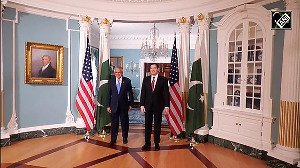The Group of Eight on Wednesday said that it 'looked forward' to working with India, the International Atomic Energy Agency and the Nuclier Suppliers Group to help the nation secure its goal of peaceful use of nuclear energy, just a few hours before New Delhi had the draft nuclear safeguards agreement with the IAEA circulated to the nuclear watchdog's Board of Governors.
Briefing the media aboard Air India One while returning from Japan on Wednesday, Foreign Secretary Shiv Shankar Menon said that the G-8 leaders expressed the eagerness to "work with India, the IAEA, the NSG and other partners to advance India's non-proliferation commitments and progress so as to facilitate a more robust approach to civil nuclear cooperation with India to help it meet its growing energy needs in a manner that enhances and reinforces the global non-proliferation regime."
The draft agreement is the next step in getting the Indo-US civil nuclear deal operationalised, and it will be taken up for discussion by the IAEA board at a meeting in Vienna on July 28.
As India is not a signatory to the Non-Proliferation Treaty, it needs approval from the IAEA, the NSG, and that of the US Congress to finally get the deal cleared.
The G-8 Summit in Japan was certainly about climate change: it raised the political temperatures in India and overseas.
Meanwhile, Prime Minister Manmohan Singh returned home early on Thursday morning from his hectic three-day visit to Japan.
He was in Japan to attend the G-8 Summit and held discussions with the leaders of the world's wealthiest states.
The prime minister had met with US President George W Bush on Wednesday, on the sidelines of the summit, to discuss the Indo-US civil nuclear deal.
During his stay in Japan, he also met the leaders of Japan, France, Russia, Britain, Germany, Italy, Australia, Mexico, Brazil, etc.
Dr Singh discussed issues related to rising food inflation, energy costs and security, world economy, structural imbalances in the financial markets, climate change, migration, etc with these leaders. The issue of India's civil nuclear deal with the United States also figured in almost all his discussions during his visit to Japan.
At the media briefing the foreign secretary and National Security Advisor M K Narayanan, the NSA said that whoever the prime minister met in Japan agreed to provide support to India.
This, said the foreign secretary, proves the tremendous goodwill that has been generated for the country. They also said that 'nobody gave a negative response.'





